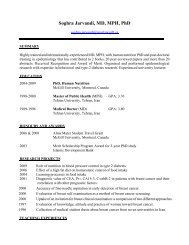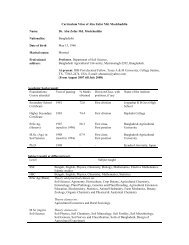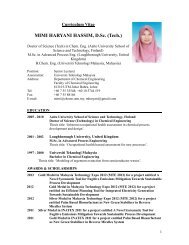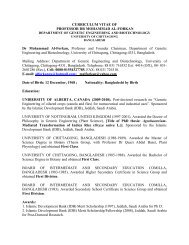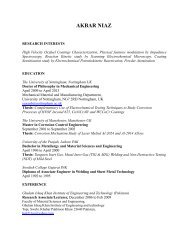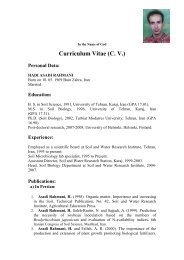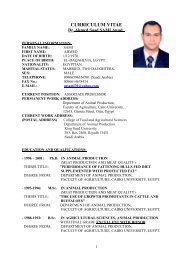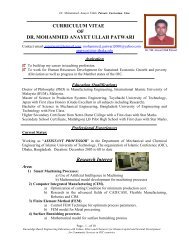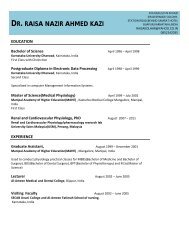Engineering: issues, challenges and opportunities for development ...
Engineering: issues, challenges and opportunities for development ...
Engineering: issues, challenges and opportunities for development ...
Create successful ePaper yourself
Turn your PDF publications into a flip-book with our unique Google optimized e-Paper software.
ENGINEERING: ISSUES CHALLENGES AND OPPORTUNITIES FOR DEVELOPMENTin the specific historical convergences that brought engineerstogether with other practitioners <strong>and</strong> stakeholders <strong>and</strong>put their various <strong>for</strong>ms of knowledge into contact with oneanother. How did these projects emerge <strong>and</strong> what contributedto their broader significance? Who had stakes in their <strong>development</strong><strong>and</strong> outcomes? What were the outcomes, <strong>and</strong> <strong>for</strong>whom?It makes a difference to the status of engineering work thatmany hydroelectric dams in the United States were built duringthe New Deal as means to revitalize economic growth <strong>and</strong>employment while many hydroelectric dams in what has beencalled the ‘developing world’ were built during the geopoliticalcompetitions of the Cold War. In the first case, the focuswas on using engineers within the home country to facilitaterecovery from the Depression, positioning the engineers asagents of collective welfare, sometimes even granting themheroic status (e.g. Hoover Dam). 28 In the second, the projectwas often an explicit negotiation between political <strong>and</strong> economicleaders in two different countries, one agreeing toaccept technological assistance in exchange <strong>for</strong> political <strong>and</strong>economic commitments, <strong>and</strong> the other using engineering toextend <strong>and</strong> maintain political <strong>and</strong> economic influence throughassistance. In this latter case, the meaning of engineering workwas frequently more ambiguous, depending upon who wasmaking the judgement. Yet even in the first case, the dominantaccounts of collective benefit <strong>and</strong> heroic achievementdo not take account of the perspectives of those <strong>for</strong> whomhydroelectric power counted as a loss rather than a gain. It isprobably safe to say no <strong>development</strong> project exists in whichevery stakeholder wins or finds their interests <strong>and</strong> identitiesaffirmed. For those who do not benefit or who contest itslarger societal missions, the image of <strong>development</strong> can be adistinctly negative one.Another type of question is philosophical. How do engineersinvolved in <strong>development</strong> projects define <strong>and</strong> underst<strong>and</strong>the engineering content of their work, whether explicitly orimplicitly? And how <strong>and</strong> why does that matter? For example,the achievement of effective low-cost, low-tech solutions <strong>for</strong>the removal of arsenic – a more recent type of <strong>development</strong>project – may be the product of engineers actively exchangingknowledge with members of local communities, non-governmentalorganizations, <strong>and</strong> other fields of technical expertise,e.g. chemistry. Might engineers who are trained to see themselvesprimarily as technical problem solvers find themselvesat a disadvantage in effectively engaging groups who underst<strong>and</strong><strong>and</strong> define problems differently than they do? Mightthey be reluctant, if not actively resistant, to critically engagingthe larger contexts within which they undertake <strong>development</strong>work? Would it make a difference if engineers emerged fromdegree programs <strong>and</strong> other mechanisms of <strong>for</strong>mation expect-28 Billington, David P. 2006. Big Dams of the New Deal Era: a confluence of engineering <strong>and</strong>politics. Norman: University of Oklahoma Press.ing to work with people who define problems differently thanthey do, including both engineers <strong>and</strong> non-engineers? Wouldit make a difference if they emerged with a commitment toengage in collaborative activities of problem definition <strong>and</strong>solution? 29Social, cultural, <strong>and</strong> political questions about engineers <strong>and</strong>engineering often blend together, with different researcherscalling attention to distinct dimensions. One common interestis in engineering identities, i.e. how participating in engineeringprojects contributes to reorganizing <strong>and</strong> restructuring theidentities of engineers. Continuing our examples, one mightask: how did construction of the Aswan High Dam contributeto furthering or trans<strong>for</strong>ming the identities of both Soviet <strong>and</strong>Egyptian engineers? Did the Soviet engineers underst<strong>and</strong> theirwork as action in the service of socialism, sharpening a focuson successful completion of the dam itself? Did completionof the dam enhance a sense of nationalism among Egyptianengineers, stimulating further interest in engineers <strong>and</strong> engineeringeducation across Egypt? 30 Or <strong>for</strong> engineers involved inthe El Cajón Dam in Honduras, how might actively engagingmembers of local communities <strong>and</strong> possibly selecting Europeancomponents <strong>and</strong> expertise have affected the st<strong>and</strong>ing<strong>and</strong> career aspirations of participating Honduran engineers?To what extent did they underst<strong>and</strong> themselves in relationto other engineers, other technical experts, <strong>and</strong> members ofthe local communities they were developing their technologyto serve? 31 In general, engineering studies researchers areinterested both in what is included in <strong>development</strong> projects<strong>and</strong> what is left out, in whose perspectives gain authority <strong>and</strong>whose do not, <strong>and</strong> in what is ultimately emphasized <strong>and</strong> whatremains relatively hidden.In coming years, a key reason <strong>for</strong> the relative invisibility ofengineers, their location <strong>and</strong> work as technical mediators,could become a crucial site <strong>for</strong> the examination of engineeringwork. 32 The work of mediation between science <strong>and</strong> technologyhas long been dismissed as a relatively unimportant29 For accounts of two educational ef<strong>for</strong>ts in this direction, see Downey, Gary Lee, Juan C.Lucena, Barbara M. Moskal, Thomas Bigley, Chris Hays, Brent K. Jesiek, Liam Kelly, JaneL. Lehr, Jonson Miller, Amy Nichols-Belo, Sharon Ruff, <strong>and</strong> Rosamond Parkhurst. 2006.The Globally Competent Engineer: Working Effectively with People Who Define ProblemsDifferently, Journal of <strong>Engineering</strong> Education, Vol. 95, No. 2, pp.107–122; Downey,Gary Lee. 2008. The <strong>Engineering</strong> Cultures Syllabus as Formation Narrative: Conceptualising<strong>and</strong> Scaling Up Problem Definition in <strong>Engineering</strong> Education. University of St.Thomas Law Journal (special symposium issue on professional identity in law, medicine,<strong>and</strong> engineering) Vol. 5, No. 2, pp. 101–1130; <strong>and</strong> Schneider, Jen, Jon A. Leydens,Juan C. Lucena. 2008. Where is ‘Community’?: <strong>Engineering</strong> Education <strong>and</strong> SustainableCommunity Development,” European Journal of <strong>Engineering</strong> Education, Vol.33, No.3,pp. 307–319.30 Moore, Clement Henry. 1994. Images of Development: Egyptian Engineers in Search ofIndustry. Cairo: The American University of Cairo Press.31 Jackson, Jeffery. 2007. The Globalizers: Development Workers in Action. Baltimore: JohnHopkins University Press.32 Downey, Gary Lee. 2005. Keynote Address: Are Engineers Losing Control of Technology?From ‘Problem Solving’ to ‘Problem Definition <strong>and</strong> Solution’ in <strong>Engineering</strong> Education,Chemical <strong>Engineering</strong> Research <strong>and</strong> Design, Vol. 83. No.A8, pp.1–12.170




